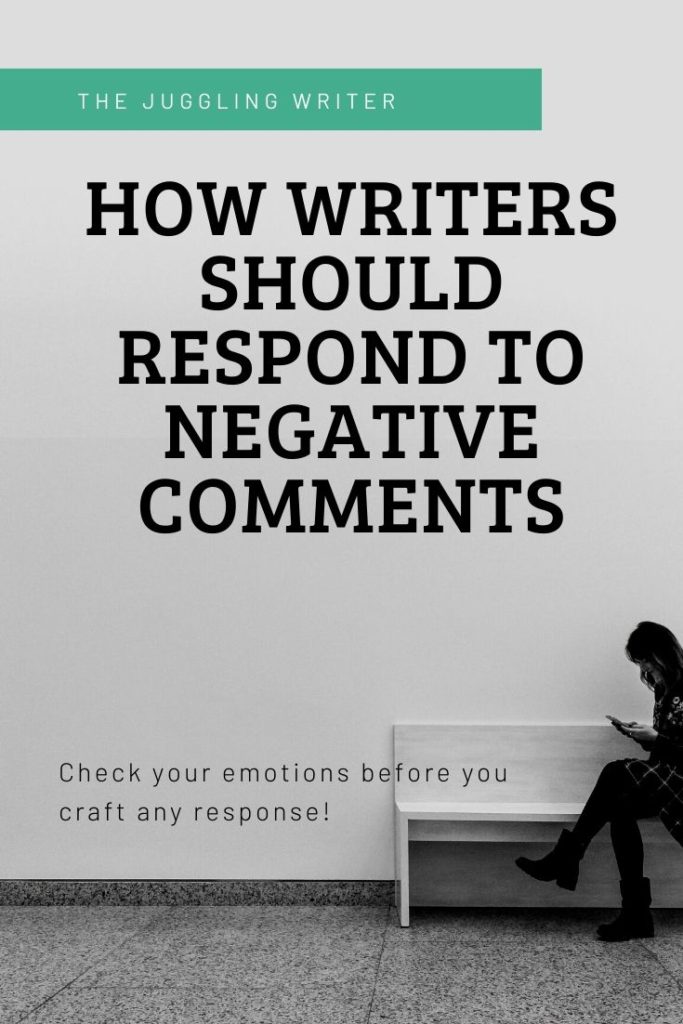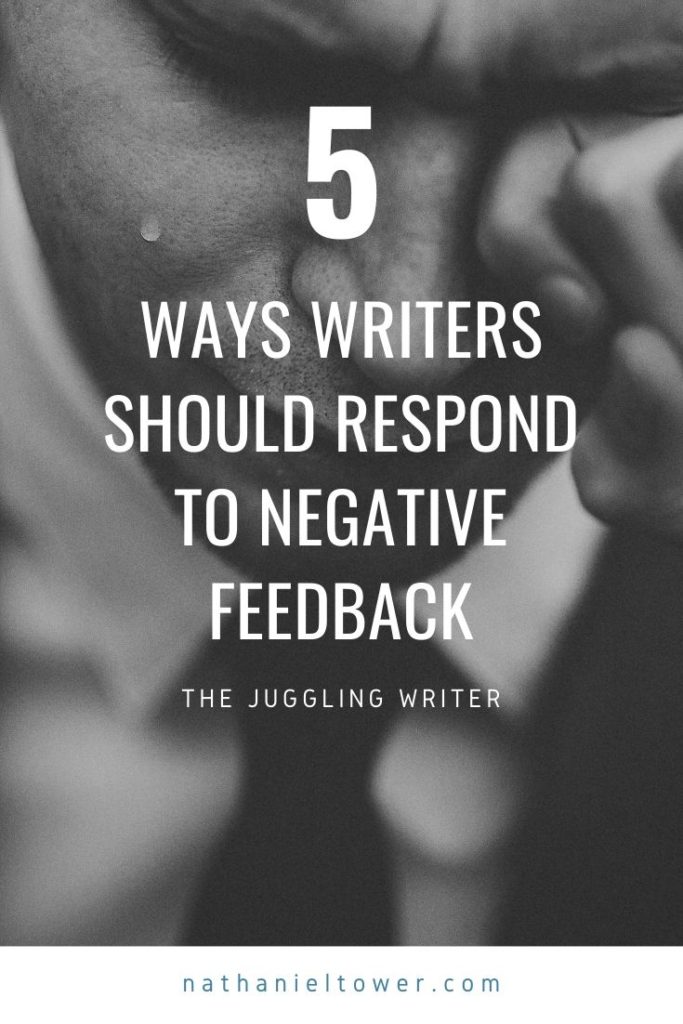Last Updated on April 26, 2020 by Nathaniel Tower
If you’re a writer and you’ve had the fortune of having your work published, you’ve also probably been the victim of negativity. If you haven’t yet, I promise you eventually will. This is true whether you self-publish, get a big book deal, or simply write for a small blog. Someone out there is going to see your work and hate it—and they’re also going to hate you for it.
When I speak of this negativity, I’m not talking about constructive criticism. As writers, we can all benefit from a hefty dose of that.
What I’m talking about here is the unproductive shit-talk that seems based purely on jealousy, hatred, or some other odd motive that only the anonymity of the internet can spark.
For writers, this can come in many different forms:
- Bad reviews that don’t say anything about the merit of the writing
- Negative blog comments that question your self-worth
- Hateful social media comments that can be so harsh as to recommend your death sentence
In most cases, the people leaving these negative comments hide behind some fake moniker. And they probably aren’t better writers than you.
When you see these negative comments, the first thing you should do is pat yourself on the back. I don’t want to say that hateful feedback means you’ve made it big, but it does suggest you wrote something of enough significance that it warranted such passion—even if that passion is misguided and likely the byproduct of some other deep-seated issue.
Of course, our initial urge probably isn’t to feel good about it. Instead, we often want to defend our writing and our good name. We might even want to clap back with our own negative response. But that’s absolutely the last thing you want to do.
5 ways writers can respond to negative feedback
As I mentioned above, you shouldn’t be personally offended by these negative comments. They are usually more indicative of the person who left them than they are of your work.
How exactly you respond to negative feedback depends on the medium. If it’s a public arena like Facebook or Twitter, you want to be very careful not to get sucked into an argument. At best, this will be unproductive. At worst, this will reflect poorly on your character.
Here are the five ways I recommend you should respond to an attack against your writing:
1. Reflect on their feedback and reread what you wrote
Before you actually respond to anything, think about the feedback that was left for you. Is it possible you wrote something that was offensive or wrong? It’s important not to immediately dismiss negative comments. Some of them will be valid.
I recently received this comment on one of my blog posts:
Dude, you’re not qualified to give advice about writing. Amazon is hiring. Try that.
This certainly wasn’t the first negative comment I received. It wasn’t even closest to the meanest. And it certainly won’t be the last.
Since I’m a human being, my first instinct was to be a little upset. Most of the comments I receive on this blog are overwhelmingly positive. Why did this individual, who identified himself as John Boner, have such a negative reaction to my post about how to get your writing published?
Of course, when the person insulting hides behind the name John Boner, it’s hard to take it seriously. Also, Amazon offers many fantastic job opportunities, so that’s really not even an insult.
Still, I decided it was time to reflect on my own words. As little as I thought of John Boner, maybe he had a point.
After rereading the post he commented on, I determined that nothing I said was overtly offensive. Either Mr. Boner was having a bad day, he just doesn’t like my face, or he likes to stir up trouble. Regardless, I quickly realized his comment wasn’t worth my time.
2. If possible, don’t respond at all
The best response to hateful negativity is not to respond at all. At least not directly. Don’t engage with the individual. If it’s a public forum, do your best to walk away. If it’s your own blog, simply don’t approve the comment. John Boner has no right to spew his hatred on my blog.
If you don’t respond, the John Boners of the world will usually move to another target. After all, they are generally fueled by attention.
3. If you must respond, try to laugh it off
It’s really easy to ignore a blog comment. It’s not as easy to ignore public mud-slinging. If you don’t control the narrative and you feel it’s absolutely necessary to respond to your haters, then the next best thing to do is to laugh it off.
Let’s say that John Boner had left his comment on a Facebook post instead of my blog. I could laugh it off with a response like the following:
Unfortunately, I couldn’t get a job at Amazon, so I started this blog instead! I’m glad you took the time to read my writing and share your opinion!
What’s John Boner going to do about that? He’s probably not going to say anything once he realizes he hasn’t gotten under your skin. And if he does respond, it doesn’t really matter because you are bulletproof at this point. Nothing John Boner says can bring you down!
4. Get some backup
If John Boner just won’t go away, then it’s time to call in the reinforcements. Rather than fighting this fight on your own, let your loyal friends and fans know what’s going on. They will come to your rescue and call John Boner out for his bullshit. They aren’t going to let some anonymous moron destroy your good name.
If you do go this route, please keep it positive. Don’t turn it into a roast of John Boner. Have your fans support you rather than trash your new rival.
5. Stay positive – and keep writing
No matter what you do to respond, this is absolutely the most important step. You are a great writer. You can’t let this one negative person bring you down. Instead of getting upset or spending your time fighting back, put that effort into improving your craft and writing something so good that even John Boner will become a fan of yours.
How do you respond to negative and hateful comments about your writing? Share your best approaches in the comments, but please do your best to keep it positive! And don’t forget to share this post on all your favorite channels.



Interesting post, Nathaniel!
In my own case, I’ve had things pretty easy on WordPress.
So far no-one hates my work more than I do! LOL! 😄
Thanks for reading and commenting! It’s only a matter of time. One day, someone will hate your work more than you do!
If you really want negative comments, you could always post them yourself under another name!
All my life people have hated me, but WordPress has been nice, so far.
Perhaps I’m too insignificant a blogger, with too small an audience, to attract the haters? One advantage of failure? LOL! 🙂
Great post. I’ve found, when I MUST respond to such a comment (or a troll or someone trying to push some agenda) that responding to the POINTS in the comment but NOT to the commenter is effective. (Your point about Amazon jobs not even being an insult, for example.) This, I think, infuriates the commenter, who’s doing this for attention after all. If you take them out of the equation, then they can feel powerless and ineffective.
Also, another species of this person lives on message boards and forums. Usually it’s the know-it-all and/or the arbiter of what is acceptable/right on the forum. They usually have a lot of posts and the right opinion on everything. I recently had a dustup with one on the Absolute Writer Water Cooler forum (not sure what I think of that medium) about publishing rights. He gave the one and only answer, caustically, and then I got responses from several editors (and publishers) who contradicted him (with examples). It was fun to watch him “move the goalposts” to qualify what he really meant a few times.
Thanks for these posts.
Paul, thanks for sharing your experience. Message boards always seem to bring out the worst in some people. Glad you were able to survive the attack!